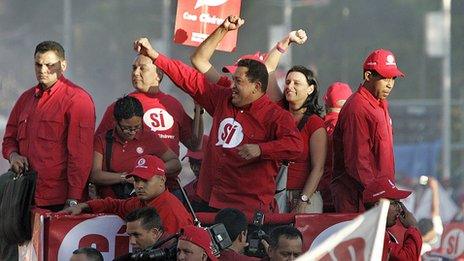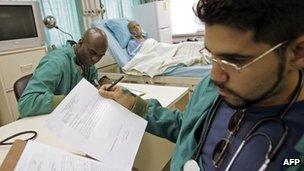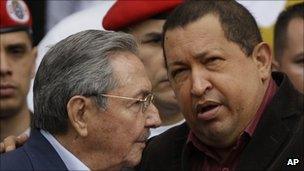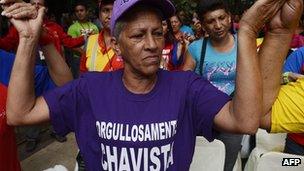Analysis: How Hugo Chavez changed Venezuela
- Published

Hugo Chavez was at the centre of Veneuelan political life for 14 years
Hugo Chavez burst onto the national scene in Venezuela in a failed military uprising in 1992.
Sentenced to jail for many years, he was soon pardoned as the Venezuelan government did not consider either him or his movement much of a threat.
Yet his uncompromising attacks on political corruption and state incompetence struck a chord in the Venezuelan people and he won the 1998 presidential election.
His first term in office was marked by moderation in foreign policy and he was a frequent visitor to the US.
However, domestic policy was more radical, with a particular focus on social programmes.
These centred on "missions" dedicated to improving access to health, education, social security, food and land for the poorest sectors of society.
An alliance began to take shape with Cuba in order to fulfil these ambitions. His support among the poor soared.
Radical change
Mr Chavez's success in introducing a new constitution in 2000 signalled longer term ambitions, as he could now run for office again with the option of re-election.
The prospect of "Chavismo" becoming permanently established in Venezuela created a backlash among those who had benefited from the old order.

Projects staffed by Cuban doctors boosted healthcare in poorer communities
A counter-revolution was soon under way and President Chavez was ousted from the presidential palace in April 2002.
The US did not plan the counter-revolution, but it almost certainly knew what was happening and did not warn the Venezuelan authorities.
Mr Chavez was restored to power in 48 hours by a military that at first appeared to have supported the coup and he immediately embarked on a vigorous campaign against his enemies at home and abroad.
Domestically, Mr Chavez's targets included the traditional political class with its strong ties to the US.
To counter their influence in the media, President Chavez promoted state television and pressured the judiciary to restrict the influence of privately-owned means of communication.
He also replaced technocrats in the state oil company (PDVSA) with loyal supporters.
Venezuela became increasingly politicised, with the debate focusing on the role of President Chavez himself.
To maintain political support, Mr Chavez expanded his social programmes using the income derived from high oil prices.
Minimum wages were increased sharply and many Venezuelans were lifted out of poverty.
Other social indicators, notably literacy, also improved and Mr Chavez and his political movement had little difficulty in defeating an opposition that was deeply divided and unable to adjust to the new Venezuelan realities.
Regional vision
In foreign affairs, President Chavez followed an aggressively anti-imperialist policy in which verbal attacks on the US became frequent.

Mr Chavez forged a close alliance with the Castro government in Cuba
He went out of his way to cultivate enemies of the US and deepened the relationship with Cuba.
Yet his most important goal was the building of an alliance among the countries of Latin America and the Caribbean that would fulfil the frustrated dream of his great hero, South American independence leader Simon Bolivar, two centuries before.
The first step towards the Bolivarian dream had been Petrocaribe - a scheme to provide cheap oil to the countries of Central America and the Caribbean that depend on imports.
It was hugely popular, with only Barbados refusing to take part.
This was followed by Alba, a regional integration scheme that would grow to include Cuba, Bolivia, Ecuador, Honduras (until 2009) and Nicaragua, as well as a few small independent Caribbean states.
Venezuela under Mr Chavez, along with Brazil under President Luiz Inacio Lula da Silva, also promoted a new regional architecture designed to embrace all American states except the US and Canada.
This led to Unasur, the Union of South American countries, and a proposed Community of Latin American and Caribbean nations (Celac).
It also led to a development bank designed to counter the influence of the IMF.
Mr Chavez's ambitions to join Mercosur (the regional integration scheme founded by Argentina, Brazil, Paraguay and Uruguay) were long blocked by the Paraguayan senate.
But political upheaval in Paraguay led to the country being suspended from the bloc, so clearing the way for Venezuela to be admitted in July 2012.
Enduring challenges
President Chavez's electoral success (he lost only one nationwide vote) did not rest, it is safe to say, on his foreign policy.

Proud to be chavista: The president inspired intense loyalty from some sections of society
This was very clear in the presidential election in October 2012, which he won despite a strong challenge from the opposition.
It was due to the social policies that won him the enduring loyalty of the country's poorest strata as well as some support from the middle classes.
But his government's policies failed to address several problems that increasingly concern all sectors of society.
The first is the high level of common criminality, illustrated most clearly by the exceptionally high homicide rate.
The second is the level of inflation, which has been exacerbated by the devaluation of the currency despite the high oil price.
The third is the continuation of government corruption, including allegations of nepotism against the Chavez family, accusations they have long denied.
Finally, there is the issue of mismanagement of state resources as a result of the politicisation of the bureaucracy, the judiciary and state-owned enterprises.
Any successor to Hugo Chavez, whether from his own party or the opposition, will need to tackle these issues, but they will do so without the undoubted charisma that has sustained Chavez's popularity for many years. When that happens, Venezuela will embark on a new chapter in its 200-year history.
Professor Victor Bulmer-Thomas is Associate Fellow, Americas, Chatham House